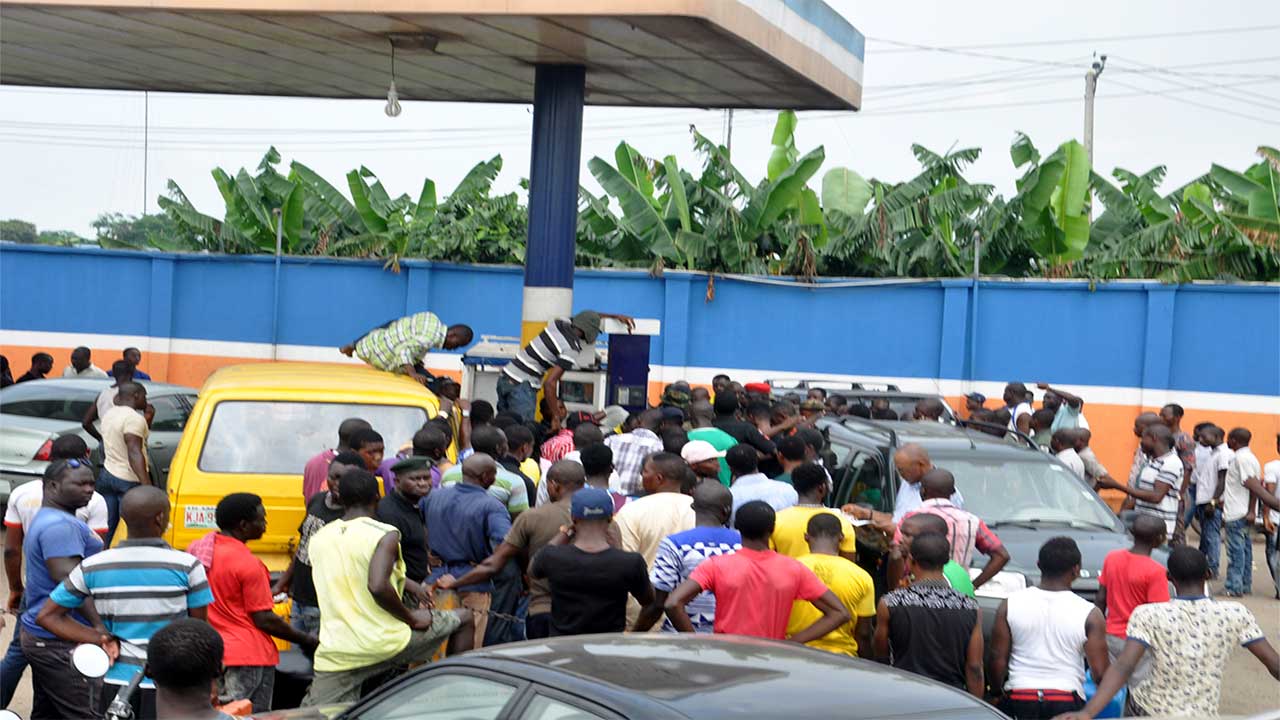The ongoing war between Russia and Ukraine may further prolong the over three-week scarcity of Premium Motor Spirit, popularly called petrol, in Nigeria, as bulk of the refined products coming into the country from the warring region and its adjoining areas are likely to face some delays.
It was also learnt that traders who supply Nigeria with refined petroleum products might pause a little due to the deficit in the supply of crude oil cargoes from the Nigerian National Petroleum Company Limited.
NNPC brings in refined petrol into Nigeria using contractors or traders through its Direct Sale Direct Purchase scheme.
READ ALSO: Fuel scarcity: NSCDC inaugurates team to prevent diversion, hoarding, sale above official price
Under the scheme, the oil company provides crude oil to its trading partners, who in turn supply the NNPC with refined products worth the volume of crude received from the national oil company.
But sources both at the oil firm and among traders stated that Nigeria through the NNPC had a deficit of about 17 cargoes in its DSDP obligation due to low oil production.
This, they said, could further prolong the fuel scarcity situation being faced nationwide, except something drastic such as the complete deregulation of the downstream oil sector was implemented.
“What we face now could be described as a perfect storm, which is when many things go wrong at the same time. We have a fundamental problem, but that problem happens at a time that other things happened and so it aggravates everything,” an oil trader with the NNPC, who pleaded not to be named due to the sensitive nature of the matter, stated.
The source added, “Now, Russia has attacked Ukraine. What is the impact of Russia’s attack on Ukraine on Nigeria? Russia is an oil-producing country, for Ukraine, our refined products come from that part of the world, not only Western Europe.
READ ALSO: Fuel Scarcity: 21 ships discharge oil, others in Lagos
“So, the price has gone up because our refined products come from that part of the world and disturbances such as the one happening there will impact supply one way or the other.”
On concerns around DSDP and how it would further prolong petrol scarcity, another trader stated the continued theft of crude oil had impeded NNPC’s ability to settle its crude oil supply obligations to traders on schedule.
The source said, “Nigeria is assigned about 1.7 million barrels of crude oil production per day by OPEC, but its production is between 1.3 and 1.4 million barrels daily. But that is a different thing. Now, from the about 1.3 million barrels that the country produces daily, people are stealing from it.
“They are creating holes in pipelines and the ones that they steal are used in illegal refineries in Rivers State, causing soothe and dirt in peoples’ lungs. The other ones that they steal, they put in batches and go to the high sea to sell them.
The source added, “Now the NNPC brings in products through Direct Sale Direct Purchase of crude. Now I’m telling you that the NNPC owes traders crude oil under the DSDP scheme and you know why? It owes crude oil because people are stealing the crude and they don’t have enough crude to pay.
Meanwhile, the cost of shipping crude oil on super-sized tankers from the United States Gulf Coast to the United Kingdom and Asia surged after attacks on vessels in the Black Sea unleashed a risk-based premium into global shipping markets.
According to Bloombergquint.com report, tanker rates for so-called Very Large Crude Carriers that can carry about two million barrels of crude from the US Gulf Coast to the Asian market jumped to about $7m on Friday from $4.4m just three days ago, according to two shipbrokers familiar with the trades.
They also said that rates for booking vessels that carry oil to the European market rose to more than $2.75m from about $1.6m they said.
The higher costs may threaten US oil exports even as Brent crude’s premium to US oil futures is the biggest it has been since the early days of the pandemic.

 Inspirational1 week ago
Inspirational1 week ago
 Featured7 days ago
Featured7 days ago
 Crime7 days ago
Crime7 days ago
 Featured7 days ago
Featured7 days ago
 Editorial3 days ago
Editorial3 days ago
 Business6 days ago
Business6 days ago
 Business2 days ago
Business2 days ago
 Agribusiness2 days ago
Agribusiness2 days ago

